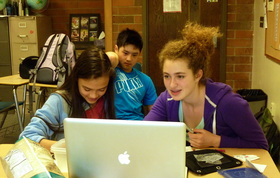Bainbridge Independent Math Circle
What is a Math Circle?

A math circle provides the opportunity for a group of students to learn about mathematics from a community mentor.
A math circle is a place to explore mathematics without the typical math club focus on math contests.
At the heart of the math circle is the spirit of interest, sharing, and collaboration.
The Bainbridge Independent Math Circle is unique in that the community mentor, Courtney James, lives in Reno, Nevada.
At the Bainbridge Independent math circle meetings, Bainbridge Island students web-conference with master teacher Courtney James.
Meetings are on Mondays during the early release time in the math classroom at EHHS.
All motivated and math curious students are welcome.
The math circle is sponsored and there is no charge for participation.
For more on Courtney James' philosophy and program visit his website, MathPerfect.
To join the Bainbridge Independent Math Circle please send an email to [email protected].
A math circle is a place to explore mathematics without the typical math club focus on math contests.
At the heart of the math circle is the spirit of interest, sharing, and collaboration.
The Bainbridge Independent Math Circle is unique in that the community mentor, Courtney James, lives in Reno, Nevada.
At the Bainbridge Independent math circle meetings, Bainbridge Island students web-conference with master teacher Courtney James.
Meetings are on Mondays during the early release time in the math classroom at EHHS.
All motivated and math curious students are welcome.
The math circle is sponsored and there is no charge for participation.
For more on Courtney James' philosophy and program visit his website, MathPerfect.
To join the Bainbridge Independent Math Circle please send an email to [email protected].
Courtney James' Philosophy
I believe that students are capable of achieving mathematical excellence if they are made to understand and embrace the different facets of mathematics: mathematics as a craft, an art, and a language.
Most students focus on the craft of mathematics by memorizing formulas and applying specific computational techniques in predetermined situations. In the extreme, this mode of learning is sometimes referred to as "plug and chug."
Many students mistakenly believe that becoming good at math simply means developing computational speed. This emphasis on speed often discourages those students whose peers are faster than they are. Speed has very little to do with attaining excellence as a mathematician.
The art of mathematics demands persistence and creativity in problem solving. Being skilled in computational techniques is useful but not sufficient because computation isn't particularly helpful when we don't know how to solve a given problem. The creative application of strategies and tactics is the key to successful problem solving.
The language component of mathematics is often ignored which is one of the reasons why so many students who are able to solve mathematical problems are unable to communicate their solutions to others. I realize that there are students who solve problems in their heads and simply write down the answers. Such students will have a very frustrating time working with me because I don't care very much about answers. I need to know how students arrive at their answers.
My goal is to share my knowledge of mathematics and my enthusiasm for learning with my students, and to serve as a guide in their pursuit of excellence.
Most students focus on the craft of mathematics by memorizing formulas and applying specific computational techniques in predetermined situations. In the extreme, this mode of learning is sometimes referred to as "plug and chug."
Many students mistakenly believe that becoming good at math simply means developing computational speed. This emphasis on speed often discourages those students whose peers are faster than they are. Speed has very little to do with attaining excellence as a mathematician.
The art of mathematics demands persistence and creativity in problem solving. Being skilled in computational techniques is useful but not sufficient because computation isn't particularly helpful when we don't know how to solve a given problem. The creative application of strategies and tactics is the key to successful problem solving.
The language component of mathematics is often ignored which is one of the reasons why so many students who are able to solve mathematical problems are unable to communicate their solutions to others. I realize that there are students who solve problems in their heads and simply write down the answers. Such students will have a very frustrating time working with me because I don't care very much about answers. I need to know how students arrive at their answers.
My goal is to share my knowledge of mathematics and my enthusiasm for learning with my students, and to serve as a guide in their pursuit of excellence.
